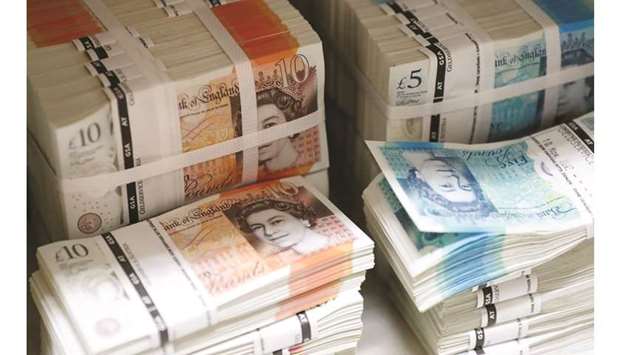The pound hit a fresh five-month peak above $1.30 yesterday on renewed Brexit optimism after Prime Minister Boris Johnson requested another extension to Britain’s scheduled departure from the European Union.
At about 1230 GMT, the pound reached the highest level since May at $1.3013.
It pulled back after the speaker of the House of Commons refused to hold another vote on Johnson’s Brexit plan yesterday, and dipped lower.
“As should come as little surprise to those who follow John Bercow, the speaker of the house has announced that there will be no meaningful Brexit vote today,” said David Cheetham, chief market analyst at XTB online trading firm.
Parliamentary rules prohibit repeat votes on the same measure.
“However, he was also keen to state that it was legitimate for the government to introduce its EU withdrawal bill and as such we can expect the key vote to take place tomorrow,” he added.
“There is a growing expectation that this bill will pass tomorrow (Tuesday) and therefore we could be set for further upside in the pound,” said Cheetham.
Johnson attempted yesterday to again to push his EU divorce deal through parliament and avoid the political damage of delaying Brexit beyond next week.
“Stock markets are in positive territory as traders are less fearful about the prospect of a no-deal Brexit,” said market analyst David Madden at CMC Markets UK.
Across Europe, London’s FTSE 100 was up 0.2% to close at at 7,163.64 points; Paris’ CAC 40 was up 0.2% at 5,648.35, while Frankfurt’s DAX 30 gained 0.9% at 12,747.96.
Instead of backing Johnson’s Brexit plan over the weekend, lawmakers mandated the prime minister to break his promise and send a letter to Brussels asking for more time.
“The main driver (for the pound) is hope of a Brexit extension being more likely, which could result in a better exit deal potentially to be negotiated than is currently on offer,” said Accendo Markets trader Samuel Springett.
The pound had already struck five-month highs last week on optimism over Johnson’s Brexit agreement with Brussels.
The option of extending the three-and-a-half year crisis past the October 31 Brexit deadline is now in the hands of the 27 other EU member states.
Elsewhere, Asian equity markets mostly rose earlier, but there was little major movement in reaction to China’s top trade negotiator Liu He saying at the weekend that Beijing and Washington had made “substantial progress” towards wrapping up a partial trade deal announced earlier this month.
The deal offered China a temporary reprieve from tariffs planned for mid-October, while Beijing said it would hike purchases of US agricultural goods.
But it did not roll back any of the duties already imposed on hundreds of billions of dollars in exports to the US, nor address another round of levies due in December.
On the Wall Street, the main indices moved higher despite Boeing shares tumbling again on doubts over its handling of the 737 MAX crisis after US aviation regulators criticised it for withholding key documents for months.
Both UBS and Credit Suisse downgraded the company following Friday’s statement by the Federal Aviation Administration that called Boeing’s handling of the documents “disappointing.”
Shares of Boeing were down 3.8% in late morning trading, after having fallen by 6.8% on Friday.

British sterling banknotes stacked in piles at the Money Service Austria company’s headquarters in Vienna, Austria (file). The pound hit a fresh five-month peak above $1.30 yesterday on renewed Brexit optimism after Prime Minister Boris Johnson requested another extension to Britain’s scheduled departure from the European Union.
